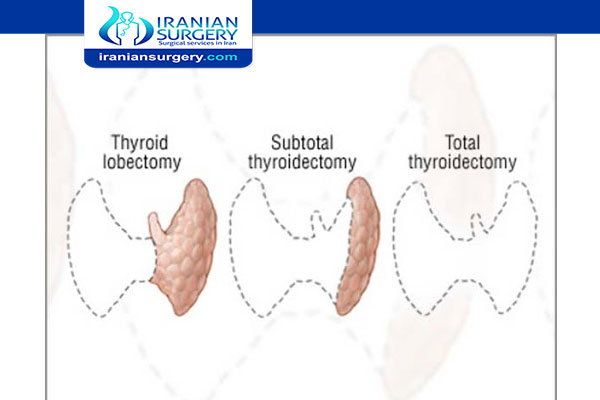Thyroidectomy Types
The various types of thyroidectomy include:
. Partial Thyroid Lobectomy (a rare procedure) — only part of one thyroid lobe is removed. This operation is not performed very often because there are not many conditions which will allow this limited approach. Additionally, a benign lesion must be ideally located in the upper or lower portion of one lobe for this operation to be a choice.
. Thyroid lobectomy — All of one thyroid lobe is removed. This is typically the "smallest" operation performed on the thyroid gland. It is performed for solitary dominant nodules, which may be thyroid cancer or those which are indeterminate following fine needle biopsy. This surgery may also be appropriate for follicular adenomas, solitary hot or cold nodules, or goiters which are isolated to one lobe (not common).
. Thyroid lobectomy with isthmusectomy — all of one thyroid lobe is removed, together with the section between the two lobes (called the thyroid isthmus). This simply means removal of a thyroid lobe and the isthmus (the part that connects the 2 lobes). This removes more thyroid tissue than a simple lobectomy, and is used when a larger margin of tissue is needed to assure that the "problem" has been removed. Appropriate for those indications listed under thyroid lobectomy as well as for Hurthle cell tumors, and some very small and non-aggressive thyroid cancers.
. Subtotal thyroidectomy — One thyroid lobe, the isthmus and part of the second lobe are removed. This operation is typical for small, non-aggressive thyroid cancers. Also a common operation for goiters that are causing problems in the neck or even those which extend into the chest (substernal goiters).
. Total thyroidectomy — the entire thyroid gland is removed. It is the operation of choice for all thyroid cancers which are not small and non-aggressive in young patients. Many surgeons prefer complete removal of thyroid tissue for all the different types of thyroid cancer.
Read more about : Thyroid Cancer Treatment
Read more about : Cancer treatment
About Iranian Surgery
Iranian surgery is an online medical tourism platform where you can find the best Surgeons and hospitals in Iran. The price of a Thyroidectomy surgery in Iran can vary according to each individual’s case and will be determined by the type of treatment you have and an in-person assessment with the doctor. So if you are looking for the cost of Thyroidectomy surgery in Iran, you can contact us and get free consultation from Iranian surgery.



